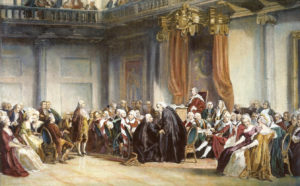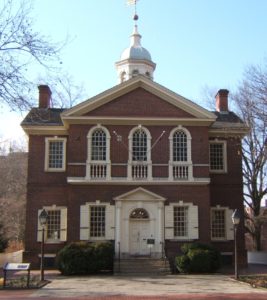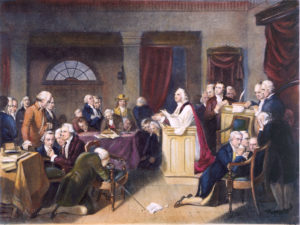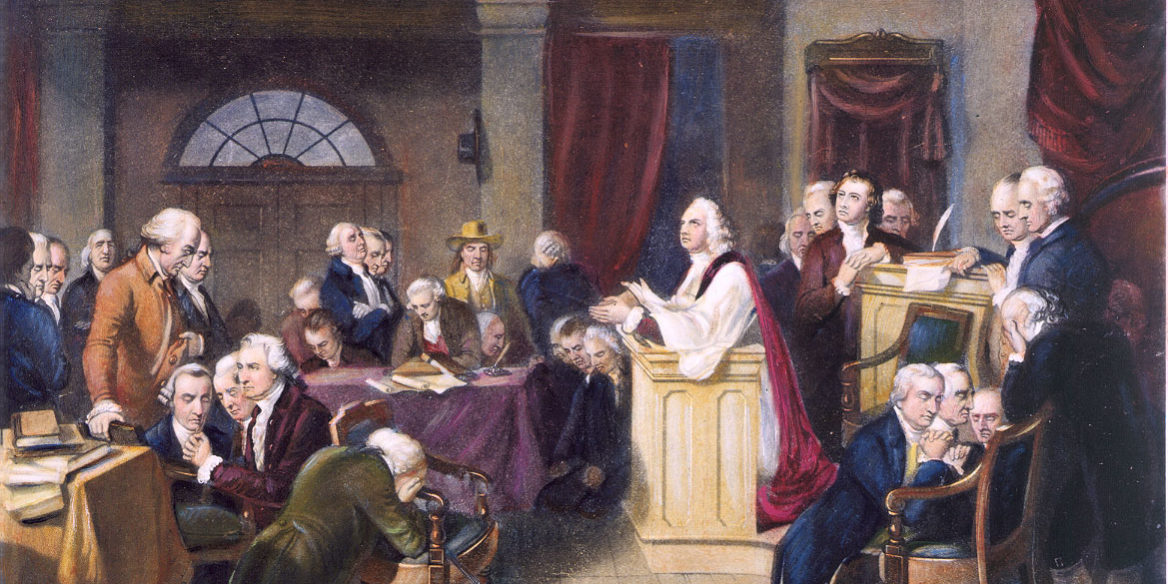 In history we find some of the best writings to be apologetics or in defense of rights. In 1774 the Continental Congress published its Declaration and Resolves stating in part: “…By the immutable laws of nature, the principles of the English constitution, and the several charters or compacts, have the following rights… life, liberty and property.” The British Parliament had passed the “Intolerable Acts” (laying siege to Boston, shutting down colonial assemblies, making British officials immune to criminal prosecution, and quartering soldiers) as punishment for the Boston Tea Party of 1773. Intending to isolate Boston, England was shocked by the response of Colonies sending in supplies and calling a day of fasting and prayer. And it was prayer the initial prayer of the delegates that was the source of the clarity written in the Declaration and Resolves.
In history we find some of the best writings to be apologetics or in defense of rights. In 1774 the Continental Congress published its Declaration and Resolves stating in part: “…By the immutable laws of nature, the principles of the English constitution, and the several charters or compacts, have the following rights… life, liberty and property.” The British Parliament had passed the “Intolerable Acts” (laying siege to Boston, shutting down colonial assemblies, making British officials immune to criminal prosecution, and quartering soldiers) as punishment for the Boston Tea Party of 1773. Intending to isolate Boston, England was shocked by the response of Colonies sending in supplies and calling a day of fasting and prayer. And it was prayer the initial prayer of the delegates that was the source of the clarity written in the Declaration and Resolves.
The colonists, well instructed in the principle of the “lower magistrate,” created their own government by consent called the Continental Congress. This principle of resistance by the lower magistrate, drawn from the Reformation, stated that one must be submitted to the rule of law before any form of resistance can be legitimately given to civil authorities. Since England had begun to dissolve the colonial Assemblies, they formed their own so that any form of self-defense would be “under authority” and they would take no direct resistance against the British Empire. It was taught in the pulpits of America that direct resistance is rebellion and God would become our adversary. Spiritually speaking they were right for one must submit to God’s authority before successfully resisting the enemy (James 4:7).
 When the Continental Congress first met on September 5, 1774 at Carpenter’s Hall in Philadelphia, there was a sober atmosphere, knowing that England, their mother country, which had the greatest army on earth, was sending troops to force them into submission. The delegates were as conscious of submitting to God as the people that sent them. J. T. Headley, author of the book The Chaplains and Clergy of the Revolution, published in 1864, described the scene by quoting the letter John Adams wrote to his wife Abigail:
When the Continental Congress first met on September 5, 1774 at Carpenter’s Hall in Philadelphia, there was a sober atmosphere, knowing that England, their mother country, which had the greatest army on earth, was sending troops to force them into submission. The delegates were as conscious of submitting to God as the people that sent them. J. T. Headley, author of the book The Chaplains and Clergy of the Revolution, published in 1864, described the scene by quoting the letter John Adams wrote to his wife Abigail:
“When the Congress met, Mr. Cushing made a motion that it should be opened with Prayer. It was opposed by Mr. Jay of New York and Mr. Rutledge of South Carolina because we were so divided in religious sentiments, some Episcopalians, some Quakers, some Anabaptists, some Presbyterians and some Congregationalists, that we could not join in the same act of worship. Mr. Samuel Adams arose and said, ‘that he was no bigot, and could hear a Prayer from any gentleman of Piety and virtue who was at the same time a friend to his Country. He was a stranger in Philadelphia, but had heard that Mr. Duche’ deserved that character and therefore he moved that Mr. Duche’, an Episcopal clergy man, might be desired to read Prayer to Congress tomorrow morning.’ The motion was seconded, and passed in the affirmative.”
The date was September 7, 1774 when Jacob Duche arrived before the Continental Congress. He read several Prayers in the established form and then read the Psalter for the 7th of September which was the 35th Psalm. Adams writes to Abigail “you must remember this was the next morning after we had heard of the cannonade of Boston.” He then added, “it seemed as if Heaven had ordained that Psalm to be read on that morning.”
 Adams went on to say “After this, Mr. Duche unexpectedly to everybody, struck out into extemporary Prayer, which filled the bosom of every man present… It had excellent effect upon every body here.”
Adams went on to say “After this, Mr. Duche unexpectedly to everybody, struck out into extemporary Prayer, which filled the bosom of every man present… It had excellent effect upon every body here.”
Adams then quotes from part of Psalm 35 to his wife Abigail: “Plead my cause, O Lord, with them that strive with me; fight against them that fight against me; take hold of shield and buckler, and stand up for my help; draw out also the spear, and stop the way against them.”
As recorded by Headley, Duche’ prayed:
“O Lord, our Heavenly Father, high and mighty, King of kings and Lord of lords, who dost from thy throne behold all the dwellers on earth, and reignest with power supreme and uncontrolled over all kingdoms, empires and governments, look down, we beseech thee, on these our American States, who have fled to thee from the rod of the oppressor, and thrown themselves on thy gracious protection, desiring henceforth to be dependent only on thee – to thee have they appealed for the righteousness of their cause – to thee do they now look up for that countenance and support which thou alone canst give. Take them, therefore, Heavenly Father, under thy nurturing care, give them wisdom in council, and valor in the field. Defeat the malicious designs of our cruel adversaries. Convince them of the unrighteousness of their cause, and if they still persist in their sanguinary purpose, O let the voice of thine own unerring justice sounding in their hearts constrain them to drop the weapons of war from their unnerved hands in the day of battle.
Be thou present, O God of wisdom, and direct the councils of this honorable Assembly. Enable them to settle things on the best and surest foundation, that the scene of blood may be speedily closed – that order, harmony, and peace may be effectually restored, and truth and justice, religion and piety may prevail and flourish amongst thy people. Preserve the health of their bodies and the vigor of their minds. Shower on them and the millions they here represent such temporal blessings as thou seest expedient for them in this world, and crown them with everlasting glory in the world to come. All this we ask in the name and through the merits of Jesus Christ thy Son, our Savior. Amen.”
This was one of those moments in history that captured the moving of God’s Spirit. Washington was there with Patrick Henry, John Randolph, Richard Henry Lee and John Jay along with John and Samuel Adams of Massachusetts. In all, 56 delegates from every colony except Georgia attended. John Adams wrote “It was enough to melt a heart of stone. I saw the tears gush into the eyes of the old, grave Pacific Quakers of Philadelphia.” Amazingly, Jacob Duche, who had been used so mightily in that hour and throughout the year of 1775, when he saw things go badly in 1776 and 1777, turned away from his country, ran to the British, and fled Philadelphia for England. But let us remember that God reigns, not mankind. The Scripture read by Duche, ordained by God, and then spontaneously prayed, inspired a group of patriots who began their deliberations on their knees. This is what must happen again – oh may the Spirit of God fill delegates and move our Congressional halls again!







